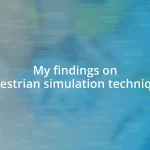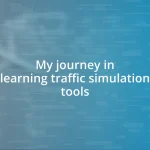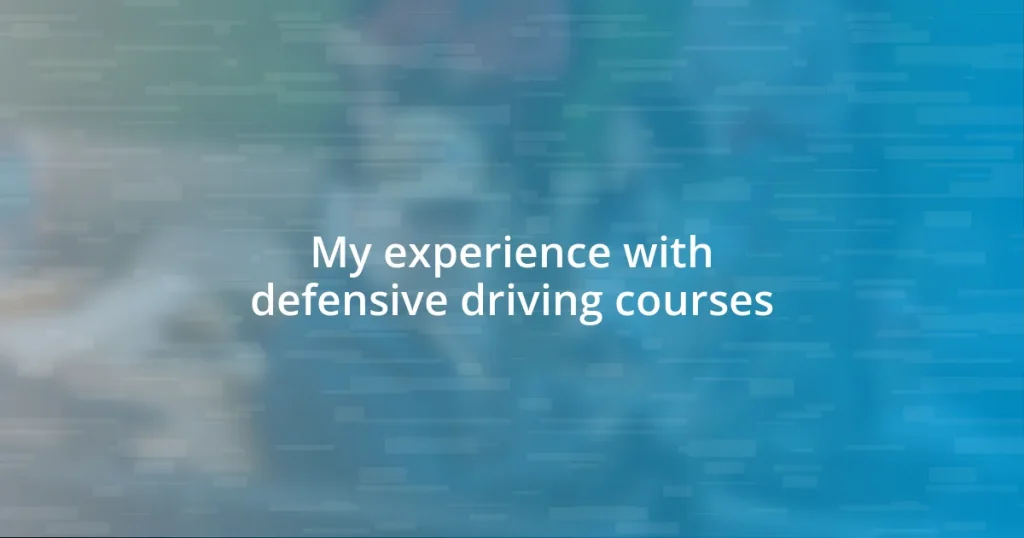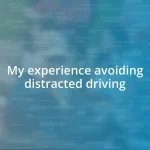Key takeaways:
- Defensive driving courses enhance awareness and proactive driving strategies, transforming driving from a routine task to a responsibility.
- Personal experiences, such as a near-miss incident, motivated the author to join the course for safety and to set a positive example for younger siblings.
- Key skills learned include hazard anticipation, speed management, and effective communication, which are applicable in real-life situations, fostering a sense of empowerment and safety on the road.
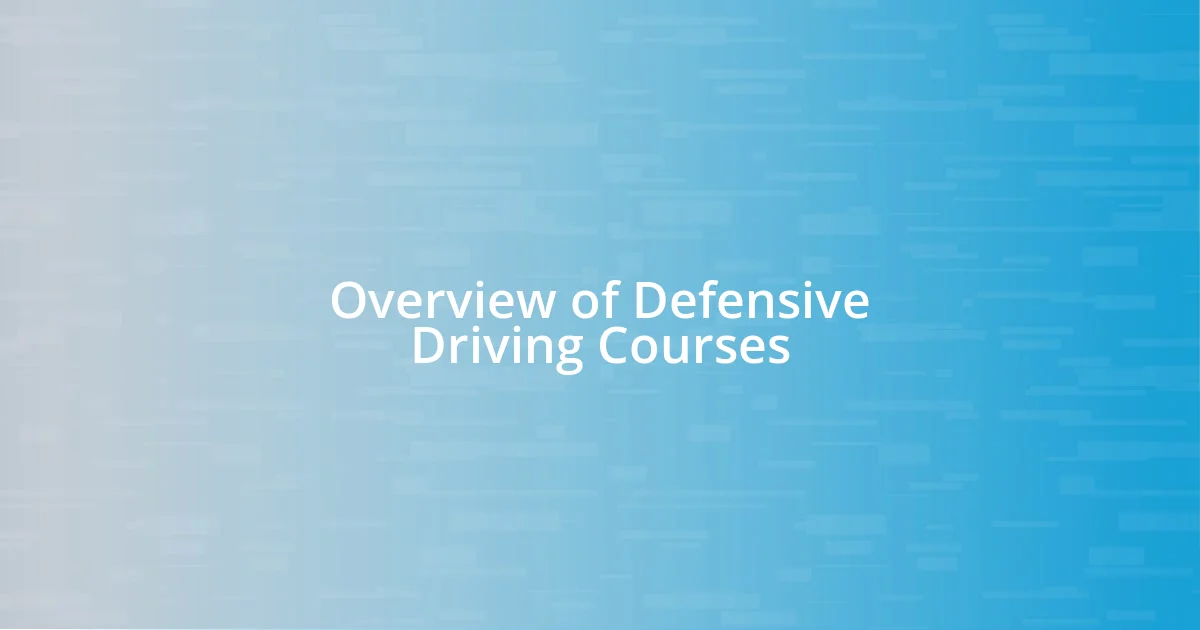
Overview of Defensive Driving Courses
Defensive driving courses are designed to teach drivers how to anticipate and respond to potential hazards on the road. I remember sitting in my first class, feeling skeptical about whether I’d learn anything new. Then, I realized that these courses provide practical strategies that go beyond typical driving habits, including understanding the psychology of other drivers.
What I found particularly enlightening was how the curriculum often emphasizes awareness and proactive driving. For instance, I learned techniques for maintaining a safe following distance and recognizing risky behaviors in other drivers. Have you ever felt that sense of dread when someone tailgates you? These courses can equip you to handle such stressful situations calmly and confidently.
While some may think defensive driving courses are just a boring requirement, they can genuinely change how you approach driving in everyday life. I came to see driving as not just a routine task, but as a responsibility to myself and others on the road. It prompted me to reflect: how often do we truly consider the impact our driving decisions have on those around us?
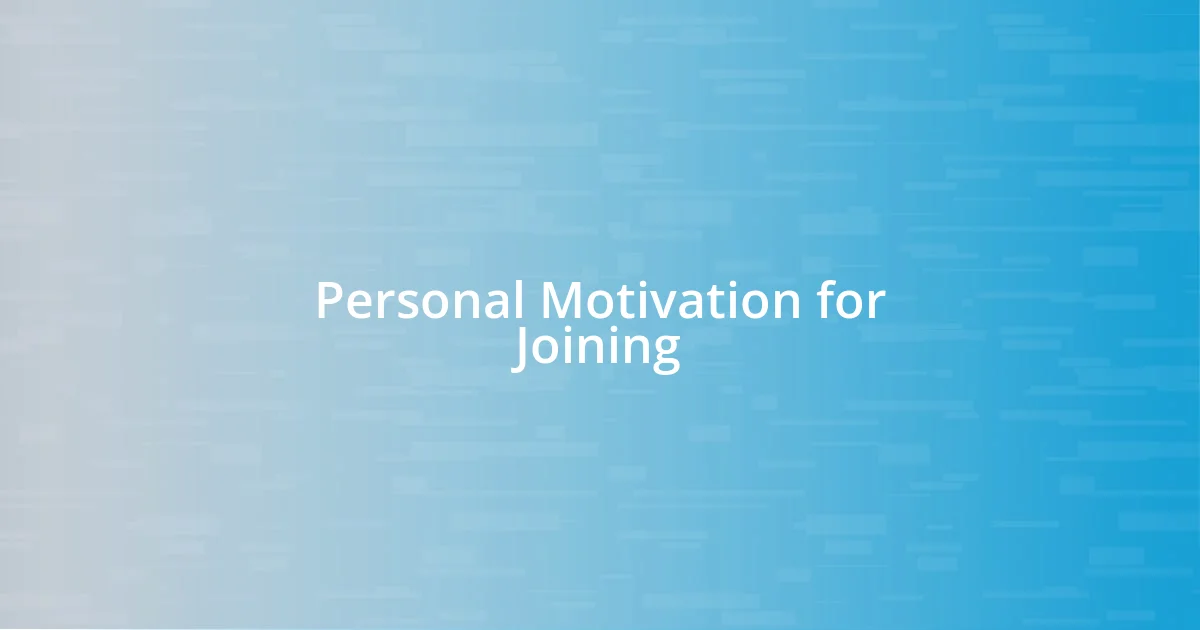
Personal Motivation for Joining
I decided to join a defensive driving course mainly after a near-miss incident that shook me up. I vividly remember the adrenaline rush as I barely avoided a collision. It made me realize that my current driving habits weren’t enough to keep me safe. This experience pushed me to seek knowledge that could help me prevent similar situations in the future.
Motivated by a desire for safety, I also wanted to set a better example for my younger siblings. As I signed up, I thought about how my actions behind the wheel could influence them. I wanted them to grow up with the understanding that being a responsible driver is about more than just following the rules; it’s about being aware of your surroundings and making wise choices at every turn.
In addition to personal safety and family influence, there was the added bonus of insurance discounts. Knowing I could save money while becoming a more confident and cautious driver was a win-win situation for me. That prospect, combined with my emotional need for security, made the decision feel even more rewarding.
| Motivation Type | Description |
|---|---|
| Personal Safety | Driven by a near-miss incident that highlighted my need for better skills. |
| Setting an Example | Desire to influence younger siblings positively in their driving habits. |
| Financial Incentive | Opportunity for insurance discounts provided additional motivation. |

Key Skills Learned in Class
I was pleasantly surprised by the variety of skills I picked up in my defensive driving class. One skill that truly stood out to me was the importance of situational awareness. I learned how to assess my surroundings quickly, like recognizing pedestrians and cyclists in busy areas. This skill became particularly handy one evening when I encountered a child running after a ball into the street. That moment reinforced how vital it is to be attentive and ready to react.
Some key skills I learned in class included:
- Anticipating Hazards: Developing the ability to foresee potential dangers, such as erratic drivers or road obstructions.
- Effective Communication: Understanding how to communicate intentions with gestures and signals to improve road safety.
- Speed Management: Recognizing the importance of maintaining an appropriate speed, particularly in adverse weather conditions.
- Aggressive Driver Techniques: Learning how to safely disengage from aggressive drivers, helping to diffuse potentially dangerous situations.
- Emergency Maneuvers: Mastering the skills needed to execute evasive actions if faced with sudden hazards, which left me feeling more equipped and confident.
Reflecting on my experiences, the emotional connection I developed with these skills cannot be overstated. Each technique felt like a tool in my pocket, ready to be utilized whenever I found myself in tricky situations. Like the time I approached a merge that suddenly became congested; my newfound skills allowed me to navigate through the chaos without losing my composure. Knowing I had the knowledge to keep myself and others safe gave me a sense of empowerment that extends far beyond just driving.
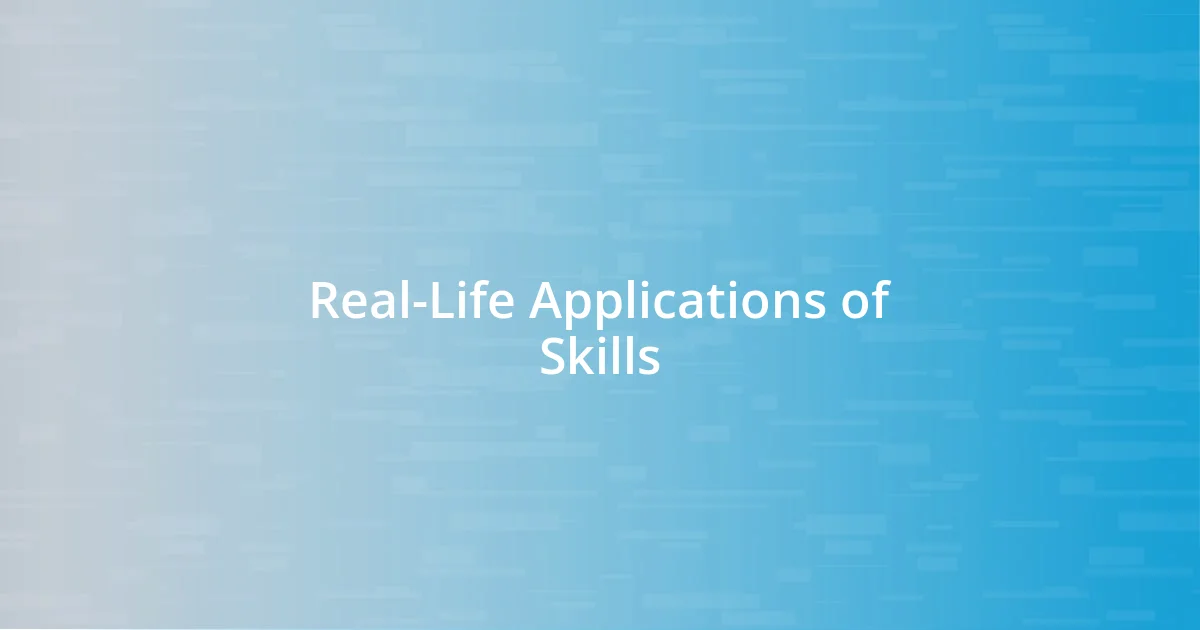
Real-Life Applications of Skills
The practical application of skills I gained from the defensive driving course truly came to life one rainy afternoon. I found myself caught in a sudden downpour, where visibility was reduced, and the roads turned slick. It was a bit nerve-wracking; however, thanks to my training in speed management, I instinctively adjusted my speed to match the conditions. This moment made me realize that mastering these skills wasn’t just theoretical; they were critical in real-world scenarios that could easily catch anyone off guard.
Another impactful experience was during my daily commute when I noticed an erratic driver weaving in and out of lanes. Instead of panicking, I remembered the techniques I learned to deal with aggressive drivers. I calmly put distance between us while keeping my cool. I couldn’t help but think: how often do drivers overlook the importance of disengaging from a potential conflict? Here, the course taught me not just how to drive safely but also how to maintain my peace during chaotic moments on the road.
Reflecting on these instances, I often wonder how many accidents could be avoided if everyone understood the importance of situational awareness. Just the other day, while driving on a crowded street, I spotted a cyclist approaching from my blind spot. I was able to adjust my position and make space for them, feeling a sense of pride knowing that my awareness made a difference. It’s these small moments that underscore the profound impact of defensive driving skills in everyday life. Each time I apply what I learned, I feel more adept and secure, not just as a driver but as a contributor to road safety.
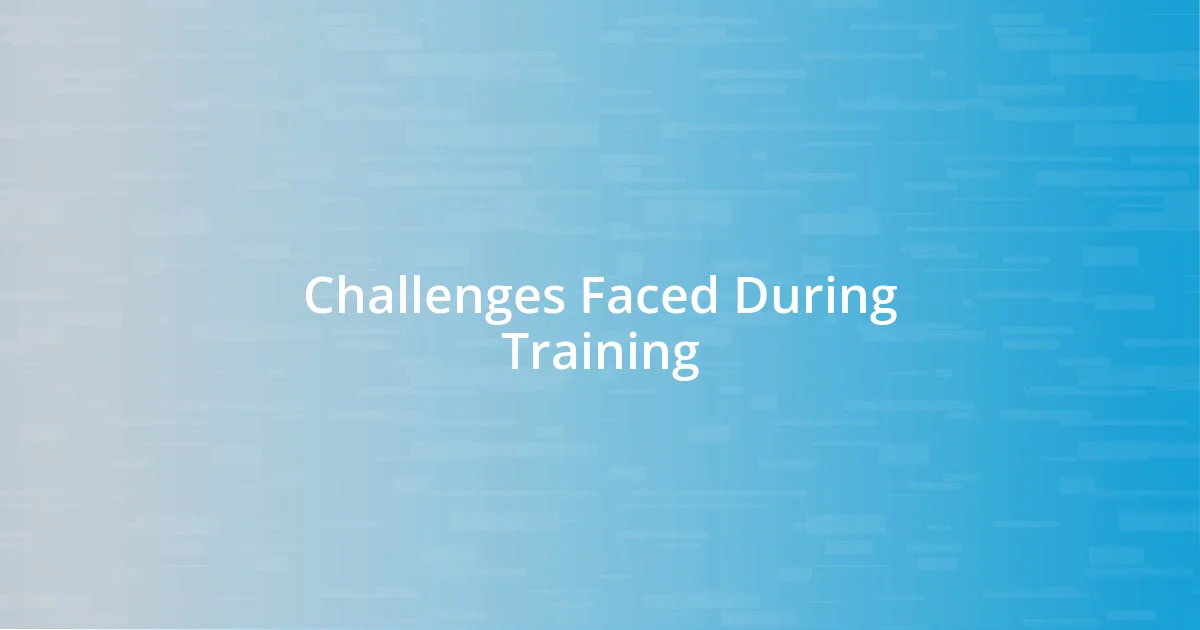
Challenges Faced During Training
One of the biggest challenges I faced during my defensive driving course was adapting to the classroom environment. The lessons were packed with information, and at times, I felt overwhelmed trying to absorb everything. I still remember a particularly long session focused on emergency maneuvers; my mind wandered as we watched videos of various scenarios. It was a constant battle between staying engaged and feeling lost in the sea of details. Reflecting on it, I realized that learning under pressure can be tough but also beneficial.
Practical exercises sometimes led to frustrating moments, too. During one hands-on driving session, I struggled with speed management while navigating a tight course. My instructor pointed out my tendency to accelerate when nervous, and honestly, it stung a bit to hear. However, that feedback was precisely what I needed to refine my skills. It reminded me that growth comes from facing uncomfortable truths and pushing through that discomfort. Have you had a similar experience where feedback turned out to be a game-changer?
Then there was the challenge of confronting my own driving habits. I had to acknowledge that I wasn’t always as aware as I thought I was. For instance, there was a day on the road when I found myself distracted by my phone, almost missing a crucial turn. The defensive driving course made me realize how easy it is to become complacent. Understanding this, I felt a pang of guilt but also a surge of motivation. That awareness became a catalyst for positive change in my driving practice, forcing me to prioritize safety and focus. Isn’t it fascinating how a course can lead you to self-reflect on something you might have brushed aside before?

Overall Impact on Driving Habits
The impact of the defensive driving course on my habits has been nothing short of transformative. I used to be somewhat careless, often cruising along without a second thought about my surroundings. Now, I find myself scanning the road with heightened awareness. It’s surprising how a simple shift in mindset can alter my entire driving experience. Have you ever noticed how your focus changes after learning something new?
One day, I realized I was approaching a red light and, instead of stopping abruptly like I used to, I calmly reduced my speed, all thanks to the techniques I learned. This change felt liberating; I was controlling the car rather than letting it control me. It made me ponder the importance of patience on the road. Could it be that driving is as much about managing ourselves as it is about handling our vehicles?
Additionally, I’ve adopted a more defensive stance toward other drivers. For instance, I often think about what could happen if a nearby driver suddenly makes an unpredictable move. By anticipating potential hazards, I can react more quickly now, which is a huge shift from my previous, more reactive approach. It creates a sense of empowerment; I feel like I’m not merely a participant in traffic but an active protector of my safety and that of others. Does that kind of anticipation resonate with you too? There’s a certain peace in knowing that I’m prepared for the unexpected.






